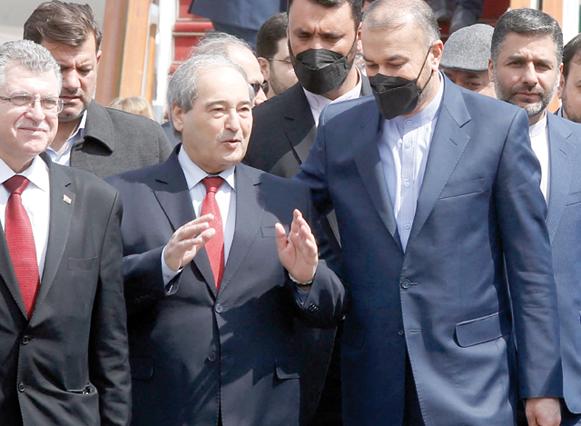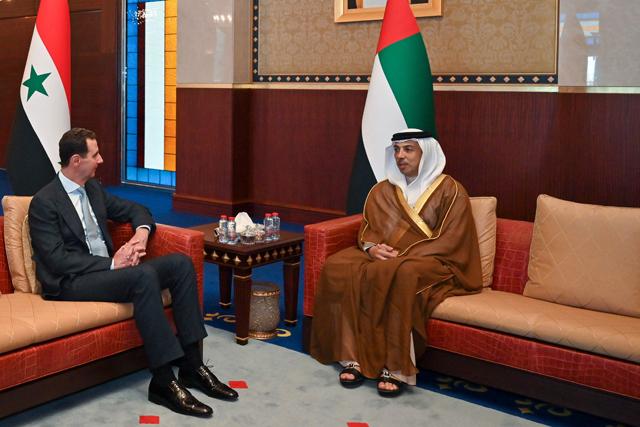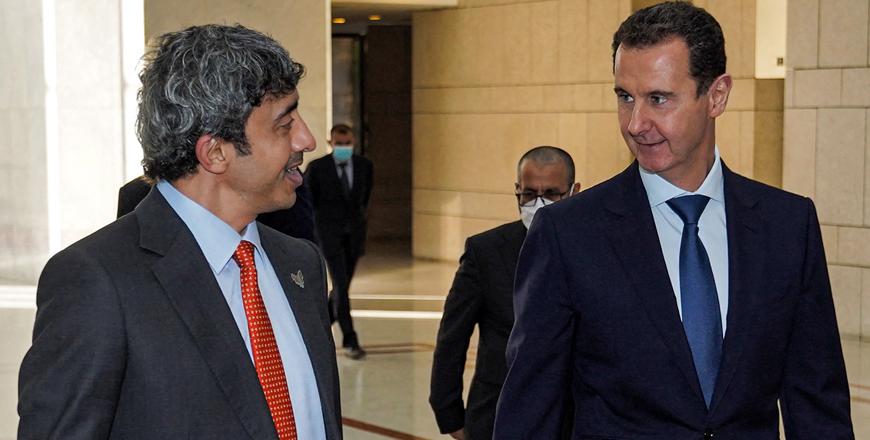You are here
Syria's Assad visits UAE, first trip to an Arab state since war
By AFP - Mar 19,2022 - Last updated at Mar 19,2022

A handout photo, released by the Syrian Presidency Facebook page on Friday shows Syria's President Bashar Assad meeting with Abu Dhabi Crown Prince Sheikh Mohammed Bin Zayed Al Nahyan, in the capital Abu Dhabi (AFP photo)
DUBAI — Syrian President Bashar Al Assad held talks in the United Arab Emirates on Friday, his first official visit to an Arab country since civil war erupted in 2011, UAE state media said.
The meeting is the latest sign of warming relations between Syria and the UAE, which had broken ties with Damascus in February 2012.
Assad met with Abu Dhabi Crown Prince Sheikh Mohammed bin Zayed Al Nahyan, discussing "fraternal relations" between the two countries, the WAM news agency reported.
They also discussed efforts to "contribute to the consolidation of security, stability and peace in the Arab region and the Middle East", it added.
Sheikh Mohammed said he hoped the visit would "pave the way for goodness, peace and stability to prevail in Syria and the entire region", WAM said.
The two leaders also discussed ways of "preserving the territorial integrity of Syria and the withdrawal of foreign forces from the country," it said, as well as means of providing "political and humanitarian support for Syria".
Syria's SANA state news agency said the meeting helped "strengthen cooperation" between the two sides.
Photographs released by the Syrian presidency also showed Assad meeting with Dubai's ruler Sheikh Mohammed bin Rashid Al Maktoum during the one-day visit.
Washington alarmed
Assad's visit to the United Arab Emirates left the US "profoundly disappointed", it said on Saturday, urging allies to avoid normalising ties with a regime accused of "horrific atrocities".
"We are profoundly disappointed and troubled by this apparent attempt to legitimise Bashar Al Assad," US State Department Spokesman Ned Price said in a statement sent to AFP on Saturday.
Assad, he said, “remains responsible and accountable for the death and suffering of countless Syrians, the displacement of more than half of the pre-war Syrian population, and the arbitrary detention and disappearance of over 150,000 Syrian men, women and children.
As US Secretary of State Antony “Blinken has reiterated, we do not support efforts to rehabilitate Assad and we do not support others normalising relations,” Price said.
“We have been clear about this with our partners... [and] we urge states considering engagement with the Assad regime to weigh carefully the horrific atrocities visited by the regime.”
Sanctions on Syria
Syria’s economy has been battered by a decade of conflict and gruelling sanctions, and the Arab League suspended Damascus after the war broke out 11 years ago.
In December 2018, the UAE reopened its embassy in Damascus, suggesting an effort to bring the Syrian government back into the Arab fold.
The move was followed by the UAE’s calling in March last year for Syria to return to the Arab League, having been a key backer of its suspension.
In November, the UAE’s top diplomat met Assad in the Syrian capital for the first time since the conflict started, a move that triggered US denunciations of efforts to normalise ties with a “dictator”.
About half-a-million people have died and millions have been displaced since the conflict erupted in 2011, after nationwide protests against the government were met with a brutal crackdown.
It escalated into a devastating and complex war that drew in numerous actors including extremist groups and regional and international powers.
The UAE is one of the six Gulf Cooperation Council member states that took a tough stance against Damascus in 2012 and eventually recognised an opposition umbrella group as the representative of Syria.
Damascus has struggled to secure international aid, namely from oil-rich Arab states.
But in recent years, some regional powers see warming up to Damascus as a way of luring Syria away from the exclusive regional influence of Iran, a staunch supporter of Assad’s government that has expanded its military footprint in Syria throughout the course of the conflict.
Earlier this month, the UN commission for inquiry on Syria called for “a review of the implementation and impacts of sanctions currently imposed on Syria” in light of deteriorating living conditions.
But on Tuesday, Britain, France, Germany, Italy and the United States said in a joint statement that they do “not support efforts to normalise relations with the Assad regime”.
The statement was made to commemorate 11 years since the start of the anti-government uprising in Syria, which was marked by thousands of protesters in Syria’s rebel enclave of Idlib.
Related Articles
DAMASCUS — Iran’s top diplomat on Wednesday welcomed efforts to “normalise relations” between some Arab countries and Syria, days after Pres
BEIRUT — A surprise visit by Syria's Bashar Assad to the oil-rich United Arab Emirates opens the door to his regime's return to the embrace
DAMASCUS — The United Arab Emirates’ top diplomat met Syria’s President Bashar Al Assad in Damascus on Tuesday, state media said, in the fir















